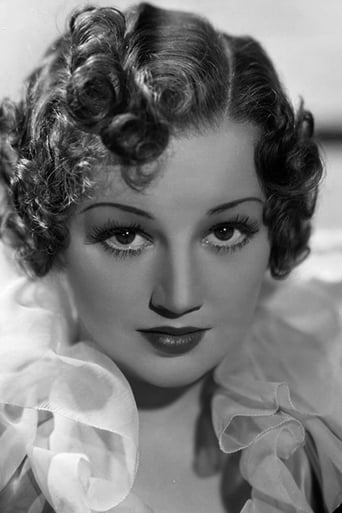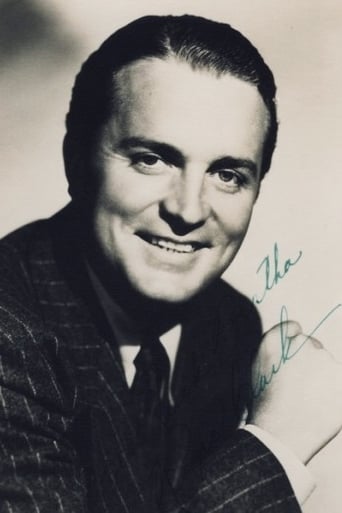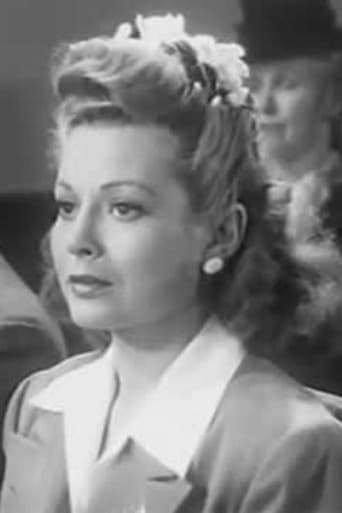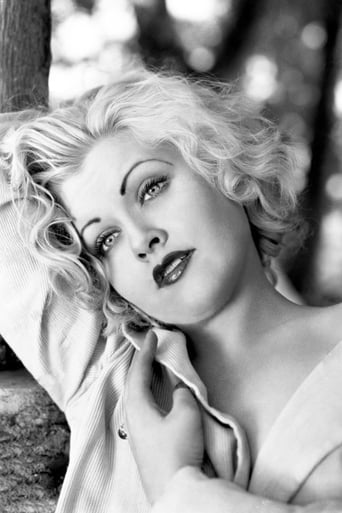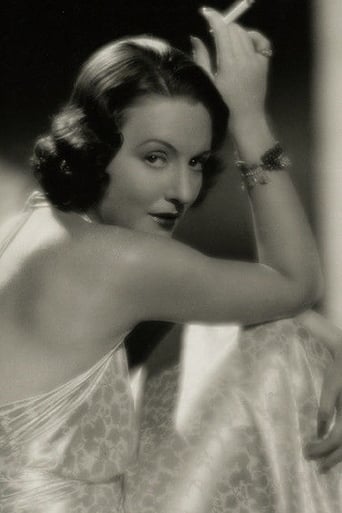Voxitype
Good films always raise compelling questions, whether the format is fiction or documentary fact.
Ava-Grace Willis
Story: It's very simple but honestly that is fine.
Logan
By the time the dramatic fireworks start popping off, each one feels earned.
Benoît A. Racine (benoit-3)
Thanks to TCM, I am acquainting myself with this little gem. I was actually stopped in my tracks while channel-hopping by the sight of what I thought was Olivia de Havilland having a very bad hair day. This was our main character and the resemblance with Olivia was only accidental. No self-respecting actress would have compromised herself in those monumental, gravity-defying hair-dos and with such a bad script. The story is convoluted, improbable and totally lacking in logic, as shocking, "daring" and exploitative as it strives to be. The acting is really, really bad with most of the actors lacking direction and not knowing what to do with their body parts except squaring their shoulders, leaning on things, scowling, acting gruff, walking in and walking out of "rooms" and lighting a cigarette or cigar that the editing can't seem to keep track of. The wall-to-wall stock music is especially turgid and repulsive and conspires to deprive every single scene of what little dignity it has left. It gives new meaning to the word "melodrama": a generic Spanish bolero accompanies the bitching of female inmates sitting around a prison parlour; a pointless bit of business in a laboratory is helped along with a depressing vaguely Hungarian "valse triste", and so on. Still, the film is ahead of its time in many ways, and one would have to wait nearly 12 years to see such wooden acting, narrative incompetence and low production values at the service of a pointless storyline again in the films of Ed Wood and Jean-Luc Godard. And with original scripts being what they are in Hollywood these days, this film is probably scheduled for a CGI-augmented remake starring Bruce Willis.
max von meyerling
I guess if I wanted to I could wax philosophic at some length in order to praise Edger Ulmer, a legitimate auteur, in order to prove something or other but, frankly, stylization be damned, this picture is nearly totally incoherent. If this had been made ten years earlier the surrealists would have raved. Ten years later and it would have been an avant guard masterpiece. As it is, truly, in a way, its as delirious as an Ed Wood picture, with only the professional skills of Ulmer to distract from the perfunctory nature of the cinematic goings on (a hotel mentioned in passing is called "The Downtown Hotel"). Not one ounce more than necessary is expended.There is no real logic to the film except one is watching it. If no one ever saw this film would it exist? Its like George's idea for a TV show about nothing. Why, the network exec asks him, if its about nothing, why would anybody watch it? Because its on TV replies George. Why does this picture exist? Because someone had it made. There was a budget, no matter how small, and it needed to be spent. There are just so many 'privileged' moments. The music, most of which seems to be generic, (from a stock disk) also includes, whenever the villain named Johnny is being discussed, variations on When Johnny Comes Marching Home (PD of course). At other times its just brutally mismatched snatches. The effect reminds me of the phony mentalist act from The Night Has A Thousand Eyes, where the pianist gives the front man hints via the background noodling on the piano which seems to be merely there for mood music. In the climax gunshots are missing from the soundtrack. One ten second montage of an automobile speeding along the road has footage of three different cars. The plot, which has frequent references to the legal and judicial system, seems to be divorced from any sort of even the barest notion of reality. Early on Johnny the gangster takes someone for a one way ride and then cuts to a trial verdict with Johnny going free, much to the Judge's outspoken disgust. Arline Judge is a school teacher/psychologist who is fired from the school system because her sister is married to Johnny. An action which she doesn't legally challenge because... The only job available to her is teaching at the local girls reformatory. She almost isn't appointed because of the snobbery of the mayor's wife who heads the board and whose corrupt husband is the mayor who runs Johnny's operation. I don't understand why the sister-in-law of the town's gangster would find it difficult to retain her job under a corrupt mayor, no less there be any question about her getting a crap job at a reformatory. She gets the job however and the 'girls' at the reformatory are all overweight veteran actresses in their thirties and graduates from the Iris Adrian School of Acting. There are about 15 of them with the usual reformatory scams in evidence, strictly by-the-numbers. One girl complains about being sick, is ignored and winds up dead of a burst appendix etc. Just the barest minimum of sketchy dramatic action makes a scene. The lunch scene with the girls refusing to eat that slop is played out with a minimum of fuss and sets and props. Somehow this all ties in back to the town's gangster. Judge gets her job when a worm on the board turns to defy the imperious mayor's wife and has a drink to celebrate and turns out to be an alcoholic. He does this really annoying drunk turn for the rest of the picture, with the fidelity of a high school student who does everything but actually say "hic", and which becomes exceedingly tedious but is used as a plot twist in the end. There is a guy, a cop, who is paired up with Judge so I guess that passes for romance. They first meet at Johnny's place (is it his apt. or club or what?) He's on Johnny's case but the next time he meets Judge he has been reassigned to capturing juveniles and putting them in the reformatory. To make their case, Judge steals some papers (yeah, they'll hold up in court) which will be backed by the gangsters girlfriend who is in, wait for it, the reformatory (young enough for a youth reformatory, young enough for a statutory rape charge?). Johnny the connected gangster couldn't keep her out of the reformatory even though she doesn't seem to be accused, tried or convicted of anything. No papers ever change hands during all the legal stuff in Girls in Chains. She is persuaded to testify by getting a visit from her old boyfriend a 23 year old going on 49 movie ticket seller who kisses her between the wires of the grill.The denouement comes soon enough. Note to self: if I ever try to escape the cops out a window, remember to run down the fire-escape, not up it. Or better yet, call a good lawyer (Scooter Libby?). The cop shoots Johnny in the back.Then again, every once in a while, Ulmer surprises with a neat little camera movement (like when the judge is admonishing the jury in the courtroom scene) or some added chiaroscuro or shadows during an otherwise nothing scene. All on a five day budget. The short shooting schedules and minuscule budgets have given Ulmer films like this their Dr. Johnson's dancing dog reputation but with Detour Ulmer showed it is possible to really make something great out of nothing. This is barely anything shaped from nothing. As it is this is merely the assemblage of some arbitrary scenes which roughly approximate a story but would far better serve as the basis for a pompous academic paper to prove something or other.P.S. Hairstyles are a reference standard for future period set films.
whpratt1
This is a very low budget film about women who were put behind bars in a young woman's correction facility which is controlled by a mobster named Johnny Moon, (Addison Randall). Johnney Moon controls the city government and has given his right hand hood the position as warden of this correction facility. The girls are treated like they were in a federal prison, with hard work in a laundry and solitary confinement. There is no hope for these women to rehabilitate themselves in order to obtain training for job positions on the outside in order to adjust to society. Helen Martin, (Arlene Judge) has a sister who is married to Johnney Moon and Helen has lost her job because of the bad reputation of her brother-in-law and has been advised to become a social worker at the prison. As soon as Helen walks into the prison, the story becomes interesting.
jayjerry
I don't normally post for films I haven't seen, but the comment here from 1999 caught my eye. It mentions that director Edgar G. Ulmer snitched to HUAC. I had never heard this before, nor could I find any confirmation of it. I assume the poster confused Ulmer with one of his contemporaries, Edward Dmytryk, one of the Hollywood Ten who did indeed cooperate with the committee. At any rate, 8 years is long enough for that comment to go unchallenged. I'd hate to think that Ulmer's reputation could be tarnished by this apparent error, especially among viewers of these posts who may have no other knowledge of the man or his career.
